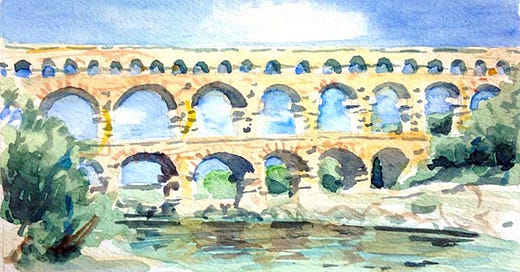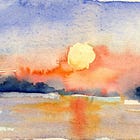Seeking to console another is a way of summoning powerful allies
Considering St. Francis' famous prayer, line by line
O Divine Master, grant that I may not so much seek
To be consoled as to console,
I began this reflection seeking alternatives to “O Divine Master,” worried it’s too anachronistic, patriarchal, or intimidating. Here’s what I found: “May I seek to comfort rather than to be comforted.”1 Or, “I ask for the strength to console others, more than I want to be consoled myself.”2 Unsatisfying. Awkward. Something missing. At least I found a lovely 5-minute guided meditation by an Irishman with a soothing voice.3
A rephrasing like May I not so much seek to be consoled as to console feels thin, doesn’t it? I like how St. Francis chimes in with this reminder: ask for help from your higher power. This second stanza brings me back to awareness of my need for spiritual grounding. I need help if I am to offer consolation to someone else.
I mentioned at the beginning of this project that I’d been reciting St. Francis’ prayer each morning before meditation in the months leading up to my father’s death. During the sad days and weeks following his passing, this phrase was very much in my awareness, offering its own consolation.
Seeking to be consoled is a turning inward, a way of balling up into a shell and waiting for help. I might as well dare people to show me that I’m worthy of love. Consoling, on the other hand, is an act of loving connection, even at a time when everyone needs it. The distinction is not between being selfish or selfless. It’s between hiding out or reaching out.
Wise teachers say that you get more of what you focus on. So when I go about yearning to be consoled, I experience more of that yearning. My inward focus dooms me to isolation and loneliness. And perhaps bitterness, if I’m not getting what I want.
At the loneliest times, the only thing that helps me feel better is to do something for another person. I learned this from a close friend in graduate school. My boyfriend was studying abroad, so this friend recommended that I volunteer weekly for Habitat for Humanity. Mostly, we glazed windowpanes and painted kitchen cabinets and bedroom walls of the poor and marginalized people living worlds away in neighborhoods near campus. When we did meet the residents, they were always sincerely grateful for our help. That work became the highlight of my week.
This verse challenges my lifelong reluctance to ask for help when I need it, which is yet another tool in the toolbox of isolation. A way to keep myself separate, to hide my vulnerability from others. Again, the first part of this verse comes into play. St. Francis asks divine source to grant that he may be able to offer consolation, rather than habitually seeking it. He reminds me that the unseen world is always there, standing by to help, if only I ask.
Old cultural traditions have various names for these reliable helpers. The Celts knew them as angels. Indigenous people were guided and aided by the spirits of plants, animals, elements and ancestors. Mr. Rogers called them our neighbors.
Part of my work these days is to gently shift my heart, mind and habits away from treating these perceptions as quaint superstitions better left in the past. Our post-Enlightenment, rational materialist culture sees itself as having displaced such beliefs with superior modes of thought and action. This blinds us to sources of guidance ,assistance, and power that we need now as always.
I’m fascinated by anecdotes that demonstrate the efficacy of prayer—as if the two modes of thinking can ever be truly reconciled. Two examples come to mind: 4,000 people meditating during seven weeks in summer 1993 in Washington, D.C., and the story of a regular guy who put up a concrete statue of Buddha in his high-crime neighborhood in Oakland. In both cases, events unfolded that included significant drops in the crime rate: a 23% reduction in violent crime in D.C. and an 82% drop overall in the Oakland neighborhood.4 I don’t care if scientific proof of such events is elusive or impossible. I know there are many other stories like this, and that’s all the proof I need.
Today, I will consider the helpers in the spirit world as real as my next-door neighbors, as real as those elderly folks whose houses we painted. I will draw on that awareness to console or help someone else, trusting that my motivation is fueled by unseen benevolence. I will trust that prayer isn’t the empty superstition of inferior minds, but an invocation of great power and mystery. Consolation is ripple sent out, returning echoes of love and connection.
The previous line of the prayer, Where there is sadness, joy, is here.
Start at the beginning of the series:
If you enjoyed this post, a lovely ❤️ keeps me going. Another way to show love is to share this post with others by restacking it on Notes, via the Substack app. Thanks!
It’s a loose, heartfelt version of the prayer.
The D.C. story is here, and the Oakland podcast is here.







I'm so sorry about your father, and I'm glad you found consolation in this prayer. I, too, use this same prayer in my daily meditation. It sets the right tone for the day.
As far as "O Divine Master" goes, I like imagining the "higher power" granting me that grace. When I meditate I use imagery--and part of that imagery is a ghostlike being sitting across from me, holding my hand. Sometimes I imagine it God, or sometimes Christ, or even just my better nature--the god within me.
Are you planning on turning these essays into a book? I think a slim volume illustrated with your watercolors would be a great thing for personal use or for a gift.
Julie, this was absolutely a lovely read. Thank you! And I'm so sorry about the loss of your father.
On the drive to visit my estranged father (I had found out that he was very ill) all of a sudden the words to the St. Francis prayer started running like a beautiful movie in my head. I didn't know I knew them. I had never studied the prayer before, but as a member of a 12-step program I'd certainly heard it and found comfort in it. That day I realized that it must have been living in me in some way, too. Thanks for helping to deepen my understanding of this prayer and for how connective it feels to learn the ways of how it shows up in all our lives.
jh